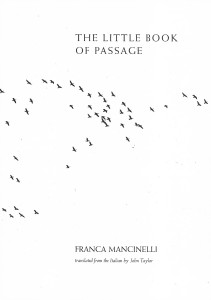Franca Mancinelli et « The Little Book of Passage » / « The Enchanting Verses Literary Review »
- Post By: johntaylor
- Date:
- Category: Actualités
The Little Book of Passage (traduit par John Taylor, Bitter Oleander Press) de Franca Mancinelli a été présenté par Pramila Venkateswaran dans la revue The Enchanting Verses Literary Review:
Franca Mancinelli achieves the best poetry in her spare sentences set into short blocks of prose in this small book. These are poems of passage, as the title suggests, road signs or signals we pass in our journeys, signals that we may or may not absorb. They are incandescent one moment, blurry the next, mundane, awe-inspiring, and the movement from one flash of language to the next is unpredictable.
What is stunning about Franca Mancinelli’s poems is their raw emotion and observation couched in succinct imagery. One catches the scent of them as the lines waft in and out of our consciousness. As if we are traveling really fast and the world outside is within our lens for a moment and then vanishes. As the translator, John Taylor, remarks in the Introduction, “Mancinelli writes clear, concise, artfully allusive Italian.The ambiguities and enigmas that fascinate in her work stem from the type of events and feelings that she explores, not from any stylistic haziness.” I felt the sense of the divine feminine as I entered deeper into her book. Nature is part of human consciousness, pictured by her as a house that has trees sticking out of it and swallows flying and out of it. In the English translation, it is curious to see the play on the noun and verb “swallows”. The house (human being) is swallowed by nature.
Other images of the divine feminine or the indescribably other occur as a presence that makes itself felt in the horizon, in the space next to you in the shape of a person who has just left; it is inexpressible, yet immanent. The reader is led to imagine the “you” of her address as an unnameable presence that is light and extraordinary, such that “A single breath from you would be enough to free me.” This “you” is not transcendent, sometimes it is the speaker herself, yet her language takes us to a deeper and heightened experience of what it is to live in the world.
Witness the first stanza in this poem:
“There is a small fault line in your chest. When I hug your chest or place my head on it there is this puff of air. It has a woodsy moistness and an earthy smell to it. The nearby mountains with their frozen torrents. Ever since I have heard it, I cannot help but recognize it. Even when high-soaring birds fly one after the other through your voice, marking out a route in the clear sky.” The crisscrossing of human and nature, articulation and smell, vision and feeling offer us the seamlessness of life, a sensibility we find in Whitman or mystical poets such as Rumi. There is a sacredness in his conjoining of nature and human which gives rise to the description of being-ness of life, or life-as-it-is in the now, experienced in the moment. Language becomes a net that manages to grasp at this fluidity and offer us momentary insights.
Epigrammatic observations make some of the poems come alive. Such as: “The earth is a rock, crumbling into tiny pieces of gravel. It is a wall and a door.” She often surprises the reader by leaping from the abstract to the ordinary: From the fanciful “You add more clay from the beginning of the world. You go to the broken, empty places” to the mundane, “Your mother’s big hands wash your hair.”
Mancinelli makes us recall a Steinian use of imagery in these prose poems. The English translation brings home to readers an appreciation for the art of prose poetry; in Mancinelli the poetic is heightened in the treasure chest of prose blocks.

Franca Mancinelli, The Little Book of Passage, Bitter Oleander Press, 2018
Laisser un commentaire